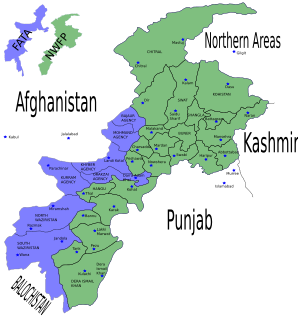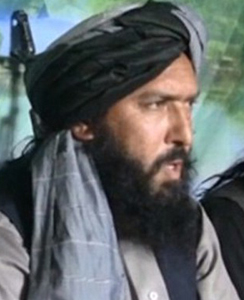Related Research Articles
Terrorism in Pakistan, according to the Ministry of Interior, poses a significant threat to the people of Pakistan. The current wave of terrorism is believed to have started in 2000 and peaked during 2009. Since then, it has drastically declined as result of military operations conducted by the Pakistan Army. According to South Asian Terrorism Portal Index (SATP), terrorism in Pakistan has declined by 89% in 2017 since 2009. Balochistan alone accounted for 48.29 per cent of Pakistan’s total terrorism-linked fatalities in 2021.
Maulavi Mohammed Abdul Kabir is a senior member of the Taliban leadership and an acting third deputy prime minister, alongside Abdul Ghani Baradar and Abdul Salam Hanafi, of Afghanistan since 4 October 2021. He previously was the acting prime minister of Afghanistan from 16 April 2001 to 13 November 2001.
Maulvi Faqir Mohammed is an Islamist militant and, until March 2012, a deputy leader of the Pakistani Taliban umbrella group Tehrik-i-Taliban Pakistan. He was reported as killed on 5 March 2010 during a helicopter gunship attack on militants by the Pakistani military although he denied the reports as false. In July 2011, he resurfaced on the air broadcasting radio shows out of Afghanistan. He was captured in Afghanistan on 17 February 2013, and released by the Afghan Taliban in 2021.

The insurgency in Khyber Pakhtunkhwa, also known as the War in North-West Pakistan or Pakistan's war on terror, is an ongoing armed conflict involving Pakistan, and Islamist militant groups such as the Tehrik-i-Taliban Pakistan (TTP), Jundallah, Lashkar-e-Islam (LeI), TNSM, al-Qaeda, and their Central Asian allies such as the ISIL–Khorasan (ISIL), Islamic Movement of Uzbekistan, East Turkistan Movement, Emirate of Caucasus, and elements of organized crime. Formerly a war, it is now a low-level insurgency as of 2017.
Fazal Hayat, more commonly known by his pseudonym Mullah Fazlullah, was an Islamist militant who was the leader of the Tehreek-e-Nafaz-e-Shariat-e-Mohammadi, and was the leader of the Tehreek-e-Taliban Pakistan in Swat Valley. On 7 November 2013, he became the emir of the Tehrik-i-Taliban Pakistan, and presided over the descent of the group into factions who are often at war with each other. Fazlullah was designated by the Al-Qaida and Taliban Sanctions Committee of the Security Council in 2015, and was added to the U.S. State Department's Rewards for Justice wanted list on 7 March 2018. Fazlullah was killed in a U.S. drone strike in Kunar, Afghanistan on 14 June 2018.

Tehrik-i-Taliban Pakistan, commonly known as the Pakistani Taliban, is an umbrella organization of various Islamist armed militant groups operating along the Afghan–Pakistani border. Formed in 2007 by Baitullah Mehsud, its current leader is Noor Wali Mehsud, who has publicly pledged allegiance to the Afghan Taliban. The Pakistani Taliban share a common ideology with the Afghan Taliban and have assisted them in the 2001–2021 war, but the two groups have separate operation and command structures.
Maulvi Said Muhammad, better known as Maulvi Omar or Maulvi Umar, is a senior Taliban commander who was captured by the Pakistani security forces in August 2009. Omar, a spokesman for the Tehrik-e-Taliban Pakistan (TTP), was a close associate of Baitullah Mehsud. His capture was seen as a major blow to the Taliban in Pakistan.
Azam Tariq or Rais Khan was a spokesperson for the Tehrik-i-Taliban Pakistan (TTP) and the fourth-highest ranking commander in the group. The TTP chose him as its spokesman after his predecessor, Maulvi Umar, who was detained by Pakistani authorities in August 2009.

Jamal Said better known by the nom de guerreMullah Dadullah and also Maulana Mohammad Jamal, was a senior member of the Pakistani Taliban. He was self-proclaimed Taliban leader in Pakistan's northern Bajaur Agency. He was killed in a NATO airstrike in the Shigal wa Sheltan District of Afghanistan's neighbouring Kunar Province on 24 August 2012. His deputy and ten Taliban fighters were also killed in the strike.
Omar Khalid Khorasani was a militant and one of the founding members of Tehreek-i-Taliban Pakistan (TTP). In 2014, he formed his own splinter militant group called Jamaat-ul-Ahrar (JuA) and was ousted by the Mullah Fazlullah-led Taliban. The same year, JuA swore allegiance to Islamic State (ISIS), however, a year later JuA rejoined TTP.
Khalid Mehsud was the deputy leader of the Tehrik-i-Taliban Pakistan and the leader of the Mehsud faction of the Taliban in South Waziristan, Pakistan. He was formerly the chief of Tehrik-i-Taliban Pakistan's South Waziristan chapter. Pakistani intelligence officials reported that he had been killed along with other 12 militants on 25 November 2015 in a drone strike carried out by the United States. Azam Tariq, spokesperson for the Sajna faction of TTP denied that he had been killed. He was killed in a drone strike on 8 February 2018 in North Waziristan, near the border with Afghanistan.
Jamaat-ul-Ahrar was a terrorist organization that split away from Tehrik-i-Taliban Pakistan in August 2014. The group came to prominence after it claimed responsibility for the 2014 Wagah border suicide attack. In October 2017, there were unconfirmed reports that Omar Khalid Khorasani, the leader of the JuA, had died from injuries sustained in a US drone strike in Paktia Province, Afghanistan. In August 2020, it merged back to TTP.

On 16 December 2014, six gunmen affiliated with the Tehrik-i-Taliban Pakistan (TTP) conducted a terrorist attack on the Army Public School in the northwestern Pakistani city of Peshawar. The militants, all of whom were foreign nationals, comprising one Chechen, three Arabs and two Afghans, entered the school and opened fire on school staff and children, killing 149 people including 132 schoolchildren ranging between eight and eighteen years of age, making it the world's fourth deadliest school massacre. A rescue operation was launched by the Pakistan Army's Special Services Group (SSG) special forces, who killed all six terrorists and rescued 960 people.
On 20 January 2016, four terrorists opened fire at Bacha Khan University near Charsadda, Pakistan. It is located in the Charsadda District of Khyber Pakhtunkhwa. At least 22 people were killed and over 20 others were wounded. Over 200 students were rescued from the premises, while the terrorists were killed by security forces. The Tariq Geedar Afridi faction of the Tehrik-i-Taliban claimed responsibility for the attack.

Hafiz Saeed Khan, also known as Mullah Saeed Orakzai, was an Islamic militant who served as the Islamic State emir for its Khorasan province, which is active in Afghanistan and Pakistan, from January 2015 until his death in July 2016. Prior to 2015, Khan was a senior commander in the Tehrik-i-Taliban Pakistan and initially a member of the Afghan Taliban.

Sheikh Maqbool Orakzai, known as Shahidullah Shahid and later as Abu Umar Maqbool al Khurasani, was a Pakistani Islamic militant who served in senior roles in both the Tehrik-i-Taliban Pakistan and in the Islamic State's province in Afghanistan and Pakistan.
The Islamic State–Taliban conflict is an ongoing armed conflict between the Islamic State and the Taliban in Afghanistan. The conflict escalated when militants who were affiliated with Islamic State – Khorasan Province killed Abdul Ghani, a senior Taliban commander in Logar province on 2 February 2015. Since then, Taliban and IS-KP have engaged in clashes over the control of territory, mostly in eastern Afghanistan, but clashes have also occurred between the Taliban and IS-KP cells which are located in the north-west and south-west.

Mufti Noor Wali Mehsud, also known as Abu Mansoor Asim, is a Pakistani Islamic scholar, cleric and jurist who is the 4th emir of the Pakistani Taliban. On 22 June 2018, Mehsud was appointed as the emir of TTP after the assassination of former emir Mullah Fazlullah in a US drone strike in Kunar, Afghanistan.
Pakistan and Tehrik-i-Taliban Pakistan peace talks is an ongoing cease fire negotiation between the Pakistani government and banned terrorist organization namely Tehrik-i-Taliban Pakistan. Its goal is ending a two-decades long war and hostilities in Pakistan. The talks are held in western Khost province of Afghanistan while the Taliban government played crucial role to bring both parties on the dialogue table. In October 2021 then-Pakistani prime minister Imran Khan expressed his view that "...if TTP surrender and accept Pakistan's law, then they will be free from charges." However, TTP denied the state of prime minister.
On 16 April 2022, the Pakistani military conducted predawn airstrikes on multiple targets in Afghanistan's Khost and Kunar provinces. Afghan officials said the attacks killed at least 47 civilians and injured 23 others, mostly women and children. Most of the people killed had been displaced from North Waziristan, Khyber Pakhtunkhwa, Pakistan, but the casualties in Kunar Province also included family members of a militant, according to locals. Initial reports described the attacks as either rocket strikes or aerial strikes carried out by a number of aircraft of the Pakistan Air Force, and Afghan officials claimed the operation was carried out by Pakistani military helicopters and jets. Pakistani officials initially denied Pakistan carried out the airstrikes, but Pakistani security officials later claimed the airstrikes involved drone strikes from inside Pakistani airspace, and that no aircraft were deployed. Some reports said the Pakistani airstrikes also targeted parts of Paktika Province.
References
- ↑ Khan, Naveed Siddiqui | Tahir (10 January 2022). "Senior TTP leader Khurasani killed in Afghanistan's Nangarhar: sources". DAWN.COM.
- ↑ Hashim, Asad. "Senior Pakistani Taliban leader killed in Afghanistan: Official". www.aljazeera.com.
- ↑ "Most wanted TTP commander killed in Afghanistan". The Express Tribune. 10 January 2022.